
Version 3.0 - Updated 2/13/97
by Bryan Caplan
The Libertarian Purity Test was first introduced last year. This is the third version of the results based upon the first 2662 test-takers. Obviously, this is not a "scientific survey" by any stretch of the imagination; the people taking the test demonstrated a degree of libertarianism far above that prevalent in the general public. Nevertheless, the results reveal a number of interesting patterns.
0 points: You are not a libertarian by any stretch of the imagination. You are probably not even a liberal or a conservative. Just some Nazi nut, I guess.
1-5 points: You have a few libertarian notions, but overall you're a statist.
6-15 points: You are starting to have libertarian leanings. Explore them.
16-30 points: You are a soft-core libertarian. With effort, you may harden and become pure.
31-50 points: Your libertarian credentials are obvious. Doubtlessly you will become more extreme as time goes on.
51-90 points: You are a medium-core libertarian, probably self-consciously so. Your friends probably encourage you to quit talking about your views so much.
91-130 points: You have entered the heady realm of hard-core libertarianism. Now doesn't that make you feel worse that you didn't get a perfect score?
131-159 points: You are nearly a perfect libertarian, with a tiny number of blind spots. Think about them, then take the test over again. On the other hand, if you scored this high, you probably have a good libertarian objection to my suggested libertarian answer. :-)
160 points: Perfect! The world needs more like you.
One somewhat puzzling fact is that the results for the first 2662 test-takers are actually slightly more libertarian than for the first 1094 test-takers. In other words, the 1568 people who took the test since my last write-up tended to raise the average. I expected a continuous decline in the average - that's what happened when I compared the 1.0 results with the 2.0 results - but it didn't happen. Is the pool of hard-core libertarians getter bigger as I write? Probably not - my guess is that the results got more libertarian because I've been advertising the test on Usenet much less vigorously.
I begin with a simple scatter diagram of the first 2662 test-takers and their scores. No clear pattern emerges at first glance, except perhaps that there is an unusual clustering at the maximum score of 160.

We now turn to a simple histogram of the raw scores. Note the following statistical properties of the distribution:
| First 2662 Tests | First 1094 Tests | |
| Mean | 75.87 | 73.09 |
| Median | 73 | 68 |
| Mode | 160 | 160 |
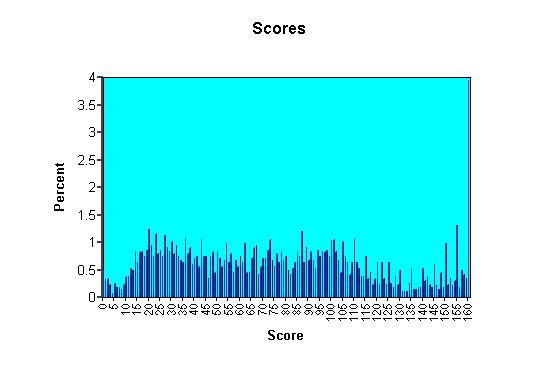
The raw scores were sorted into groups of 5 to form the following histogram. The overall pattern is somewhat clearer. The distribution is roughly uniform; however, the middle-high range is notably less populated than the middle range and the extreme highs. Note that the distribution is clearly bimodal; there is a sizable group of extremely hard-core libertarians that create a spike at the high end.

We now turn to the question-by-question analysis. While the test did not have a "maybe" option, it was possible to leave a question blank, and test-takers occasionally did so. Thus, the question-by-question charts show the percent answering yes, the percent answering no, and the percent who did not answer. (Note however that unanswered questions are counted as "no's" in the aggregate score.)
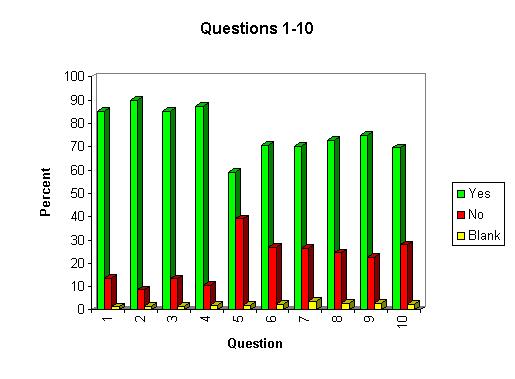
Not too surprisingly, over 85% of test-takers agreed.
Cutting spending is actually more popular with test-takers than cutting taxes (85.01% vs. 89.86%).
Here was a surprise, for me at least. Only 59.02% of test-takers favored abolishing the minimum wage. What is going on here? I've always thought of the minimum wage as one of the most widely accepted examples of "pro-worker" legislation that in fact harms the lowest-skilled workers. Is the recent, overblown empirical work of Card & Krueger gaining influence? Or have high school history teachers continued to exert their nefarious influence over the minds of their former students?
Notably more popular than abolishing the minimum wage.
72.65% of test-takers agree. I guess not too many are planning on running for Congress. :-)
Social Security appears to be barely more popular with test-takers than Medicare. In contrast, SS appears to be even more "politically untouchable" than Medicare is.
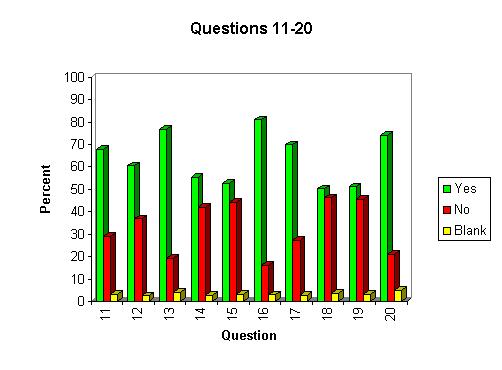
A lower pro-voucher level than one might expect. I suspect that some of the hard-core libertarians answered no on this one because they are worried about reducing the privateness of existing private schools. A sensible worry, but I still thought this would make a good test item.
Only 60.52% of test-takers favor relaxing immigration laws. Is this partly due to the recent paleo-libertarian/Mises Institute stance against immigration? Or is it merely continuing fears about free immigration?
A higher proportion of test-takers favor this measure, although the previous notes about school vouchers surely apply.
A surprisingly small percentage of test-takers favor this measure.
This one was not especially popular when I calculated the first round of results for the first 281 test-takers (61.57% said yes). Support is even lower now - just barely over 50%. Is is mainly out of paternalism (workers are too dumb to decide if a job is too risky for them)? Or is it the cultural residue of the Marxist interpretation of the wage contract as inherently biased against the worker?
Still high support for this one. It seems that AIDS activists have gradually managed to give the FDA a bad name.
Note that among test-takers, anti-poverty programs are only marginally less popular than Social Security and Medicare, whereas the general public probably distinguishes sharply between them.
Fear of unregulated professionals is surprisingly prevalent. This barely got a majority.
A bare majority supports government funding for education, one of the most regressive transfer programs on the books. (Does the high level of education of Netizens bias this one upwards at all vis-a-vis the general public?)
The Fed is remarkable unpopular -- I would have expected a lot more blank answers from people who have never heard of the Fed, but perhaps I underestimate the level of general education of Netizens. A friend of mine at the Brookings Institution speculates that left-wing hostility to the Fed for its (relatively) low-inflation policies combines with right-wing "conspiracy" hostility to the Fed to make it very unpopular in spite of limited public understanding of what the Fed does.
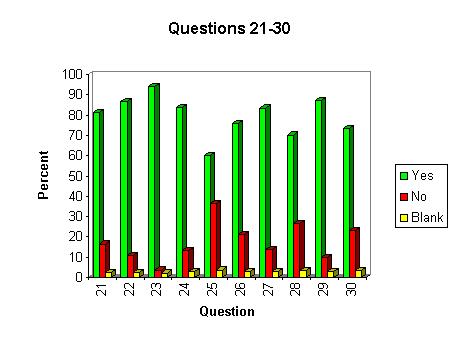
A slight decline here, from 81.72% to 81.26%. Is medical marijuana making people nervous?
Extremely high support for this one -- I thought adding "even for money," would bring the number way down.
A softball at first glance...But did readers realize that this means that hard-core porn could be shown on primetime NBC?
A surprisingly low level of opposition.
Most were against, but then again the U.S. does not currently have a draft. Probably many readers interpreted this question as also applying to wartime.
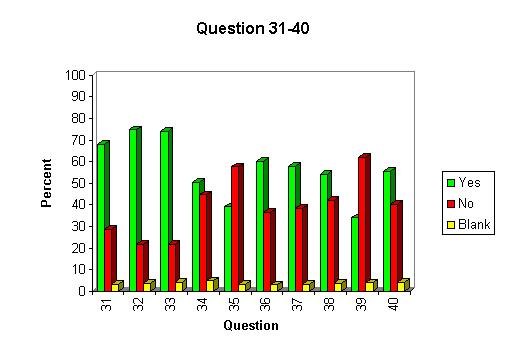
More popular than abolishing the minimum wage. Puzzling.
More popular than abolishing rent control. Similarly puzzling.
Ditto.
Surprisingly low support - just barely a majority.
Still gets a sizable majority in favor. Is this idea catching on with the general public?
No more popular than welfare among test-takers.
A complete puzzle to me -- only 34.07% said yes. The question appears to only favor privatizing national parks, deserts, mountains, and other government-owned land. What is so radical about that? I guess many people took this question to include government buildings and so on. Even that doesn't rule out government renting office space.
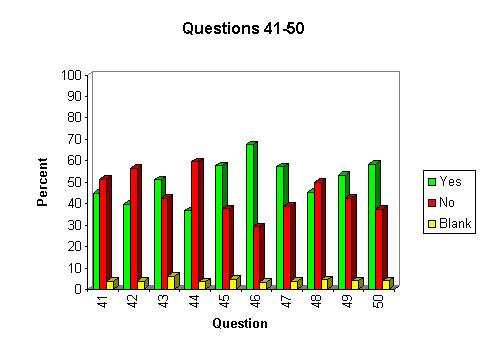
Immigrants are not very popular these days. :-(
A lot of support for this strict monetarist proposal. Some test- takers opposed it on libertarian grounds, arguing that either: (a) It still presumes the right of the government to control the money supply, or (b) While abolishing the Fed is a first-best outcome, a frozen base is not the best policy given that the Fed is going to exist (e.g., one taker suggested price level stabilization as a good second-best policy rule).
Will the doctrine of Lochner be revived? It will if 57.59% of test-takers have their way.
A bit low, considering that a number of different political viewpoints support it.
A majority agrees.
A majority agrees; a surprisingly radical result.
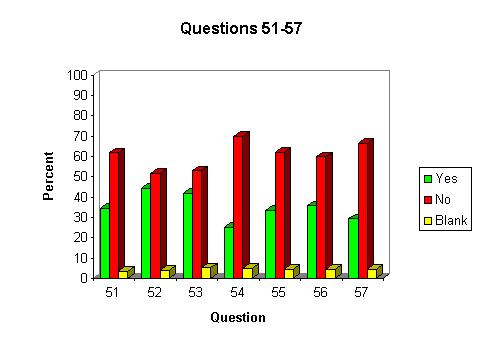
34.67% agree. Presumably this received support from Rand-influenced minarchists as well as anarcho-capitalists.
44.25% said yes! Should this have been worded "all highways and roads"? Or did some people forget the note on the meaning of privatization at the preface of the survey?
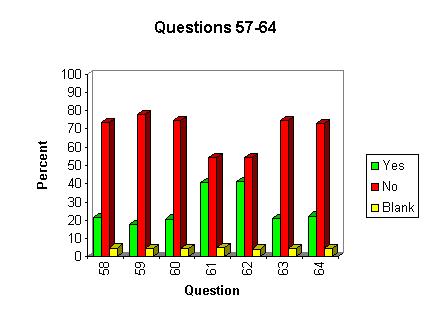
This received less support than any other question. Many self-described anarcho-capitalists answered no. Puzzling - must be the wording is somehow objectionable.
A lot of Eastwood and Bronson fans out there, I see. :-)
This is probably the hard-core minority which gives the score its unusual bimodal distribution. The percentage of anarcho-capitalists taking the test dropped from a little over a fourth to a little over a fifth.
Here's a table listing the exact results on each of the questions.
| Question | Yes | No | Blank |
| 1 | 85.01 | 13.64 | 1.35 |
| 2 | 89.86 | 8.64 | 1.5 |
| 3 | 85.05 | 13.3 | 1.65 |
| 4 | 87.45 | 10.44 | 2.1 |
| 5 | 59.02 | 39.03 | 1.96 |
| 6 | 70.66 | 26.82 | 2.52 |
| 7 | 70.1 | 26.33 | 3.57 |
| 8 | 72.65 | 24.53 | 2.82 |
| 9 | 74.72 | 22.5 | 2.78 |
| 10 | 69.53 | 27.95 | 2.52 |
| 11 | 67.69 | 28.96 | 3.34 |
| 12 | 60.52 | 36.89 | 2.59 |
| 13 | 76.71 | 19.23 | 4.06 |
| 14 | 55.45 | 41.85 | 2.71 |
| 15 | 52.59 | 44.18 | 3.23 |
| 16 | 80.92 | 16.11 | 2.97 |
| 17 | 69.91 | 27.2 | 2.89 |
| 18 | 50.26 | 46.17 | 3.57 |
| 19 | 51.17 | 45.57 | 3.27 |
| 20 | 74.01 | 21.15 | 4.85 |
| 21 | 81.26 | 16.46 | 2.29 |
| 22 | 86.81 | 10.63 | 2.56 |
| 23 | 94.1 | 3.68 | 2.22 |
| 24 | 83.92 | 13.3 | 2.78 |
| 25 | 59.99 | 36.36 | 3.65 |
| 26 | 75.84 | 21.15 | 3.01 |
| 27 | 83.51 | 13.6 | 2.89 |
| 28 | 70.21 | 26.41 | 3.38 |
| 29 | 87.26 | 9.66 | 3.08 |
| 30 | 73.44 | 22.99 | 3.57 |
| 31 | 67.96 | 28.7 | 3.34 |
| 32 | 74.68 | 21.68 | 3.64 |
| 33 | 74 | 21.79 | 4.21 |
| 34 | 50.38 | 44.74 | 4.88 |
| 35 | 39.07 | 57.59 | 3.34 |
| 36 | 60.11 | 36.74 | 3.16 |
| 37 | 58 | 38.58 | 3.42 |
| 38 | 54.09 | 42.11 | 3.79 |
| 39 | 34.07 | 61.98 | 3.95 |
| 40 | 55.63 | 40.23 | 4.13 |
| 41 | 44.82 | 51.39 | 3.8 |
| 42 | 39.71 | 56.5 | 3.79 |
| 43 | 51.13 | 42.6 | 6.27 |
| 44 | 36.74 | 59.54 | 3.72 |
| 45 | 57.59 | 37.56 | 4.85 |
| 46 | 67.54 | 29.19 | 3.27 |
| 47 | 57.21 | 38.92 | 3.87 |
| 48 | 45.38 | 50.07 | 4.55 |
| 49 | 53.34 | 42.49 | 4.17 |
| 50 | 58.49 | 37.49 | 4.02 |
| 51 | 34.67 | 61.8 | 3.53 |
| 52 | 44.25 | 51.84 | 3.91 |
| 53 | 41.89 | 52.93 | 5.18 |
| 54 | 25.02 | 70.1 | 4.88 |
| 55 | 33.4 | 62.21 | 4.39 |
| 56 | 35.69 | 59.84 | 4.47 |
| 57 | 29.3 | 66.38 | 4.32 |
| 58 | 21.64 | 73.44 | 4.92 |
| 59 | 17.73 | 77.84 | 4.43 |
| 60 | 20.74 | 74.79 | 4.47 |
| 61 | 40.5 | 54.36 | 5.15 |
| 62 | 41.21 | 54.43 | 4.36 |
| 63 | 21.07 | 74.53 | 4.39 |
| 64 | 22.39 | 72.99 | 4.62 |
My friend at the Brookings Institution and I argued about what the distribution for this test would be if it were administered to a random sample of adults in the United States. I thought most people would be in the 5-10 point range; he finally suggested the 10-15 point range. Here is my purely hypothetical guess at what the distribution would look like if it were administered "scientifically."

Comments about the test results? Send them to me at bcaplan@gmu.edu